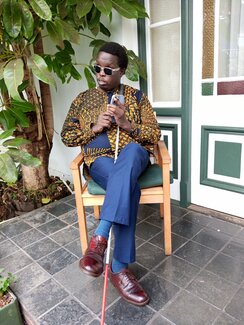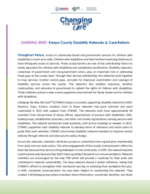
Background Information
I have a masters in public policy, previously I worked for Humanity and Inclusion. My skills include: coaching and mentorship, capacity building of technical working groups on inclusion, project management, development of tools and documentation. In my past work I held roles of innovation and creativity, accessibility auditor, and digital advocacy and campaign development.
Membership & Associations
Global Billion Strong
Member of Blind Citizen of Australia
Our Interview With Practitioner
To develop my skills I commit to keep on learning and doing reserch and updating myself on the latest.
I have learned disabilty inclusion is a process and it takes time. When you emphasize and focus on the ability of children, not the disabilities, they are able to achieve their goals and be included in the society, community and family.
I rely on having a screen reader so that I can fully engage with the many written and visual resources of the work.
The international framework, UNCRPD, is a critical resource that I use all the time
I rely on a range of wide range of articles, research and tools that are already available on disability inclusion, care reform and family care for children.
I am passionate about disability inclusion and I want to be an agent of change in order to have an inclusive society for all.
I rely on having a screen reader so that I can fully engage with the many written and visual resources of the work.
The international framework, UNCRPD, is a critical resource that I use all the time
I rely on a range of wide range of articles, research and tools that are already available on disability inclusion, care reform and family care for children.
Where They Operate
Key Areas of Work
Languages Spoken
Practitioner Resources
This learning brief was developed as part of the CTWWC 2022 annual report and shares learning from Kenya and beyond. It is intended to help other practitioners understand how disability inclusion happens by sharing examples of practice.
This learning brief shares learning from Kenya around the barriers that contribute to family separation for children with disabilities and how disability networks are working to create a supportive environment for family-based care for these children.
This Toolkit for Disability Inclusion in Care Reform represents a collection of work developed from the experience of many practitioners and organizations. The aim of this toolkit is to increase the capacity and confidence of those working in children’s care, child protection and family strengthening to mainstream disability through every step, utilizing improvements to systems, practices, skills and attitudes. We envision family care for all children and the use of residential care only as a last resort when absolutely necessary and appropriate. The toolkit reinforces the importance of placing family care for children with disabilities at the top of any care reform agenda.


